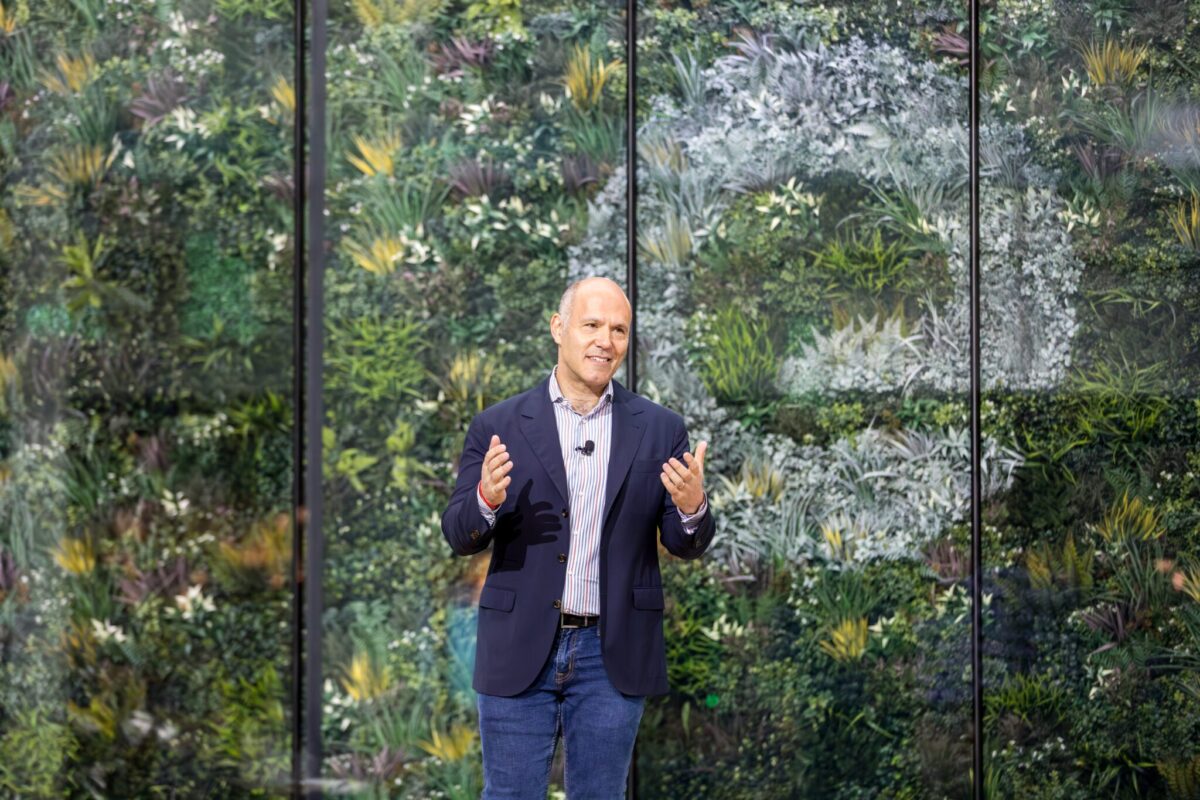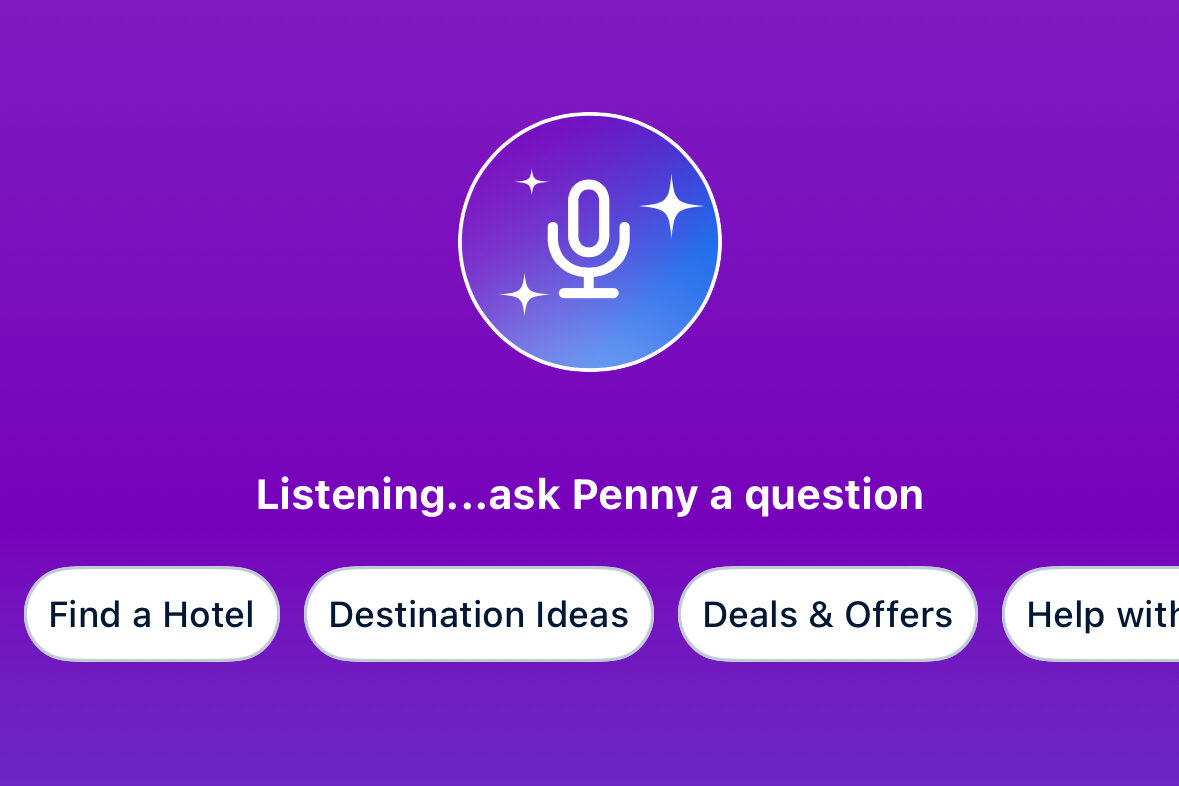Interview: Expedia CEO on How Its AI Rollouts Would Be Impossible for Prior Regimes

Skift Take
Expedia Group CEO Peter Kern, who's been working on revamping the company since April 2020, said "it would've been impossible for the old us, three years ago," to have been nimble enough to be among the first movers in generative AI among online travel companies.
Expedia's iOS app now has a ChatGPT chatbot, and the company rolled out a plug-in for OpenAI's ChatGPT platform. Booking Holdings' Kayak and Opentable have plug-ins, as well.
It's impossible to know if ex-Expedia CEOs Dara Khosrowshahi (2005-2017) and Mark Okerstrom (2017-2019) could have introduced ChatGPT tools as fast as the company did under Kern, and he wasn't looking to disparage his predecessors. You can make an argument that the two former CEOs could have done it, as well.
But Kern, who thinks the toughest big lifts are behind him other than a loyalty program launch coming in July and getting vacation rental brand Vrbo onto the Expedia tech stack, has been busy remaking Expedia over the last three years. He has shed brands, prioritized the big three Expedia, Hotels.com and Vrbo among formerly a couple dozen units, and consolidated teams across the company so they aren't focused on one particular brand or another.
In a Skift interview last week, Kern discussed the promise and hype of generative AI, and how he doesn't count out Google from eventually delivering a viable tool.
However, he hopes Bing will gain ground with its investment in OpenAI to ensure a more competitive search engine environment.
Kern scoffed at a statement from Airbnb CEO Brian Chesky that Airbnb will be a transformed company in another year because of generative AI.
"In a year? We've been at this a long time," Kern said. Airbnb isn't a newbie, though, to artificial intelligence, either.
Kern also had some good things to say about app-only online travel agency Hopper, but disparaged some of its fintech products — Kern called them "insure-tech" — as being a ripoff to consumers.
As people return to big cities, Expedia will start to focus on urban short-term rental inventory, which is not Vrbo's strength. However, don't expect to find private rooms on Expedia, Hotels.com or Vrbo.
Read the interview, which has been edited for clarity and trimmed, below.
Dennis Schaal: Did you get an advantage with ChatGPT because OpenAi CEO Sam Altman is on your board?
Peter Kern: Look, Sam's obviously a thought leader in the space, but we didn't have any inside track to what was happening, or when it was coming. We didn't know anything."
Schaal: He wasn't at the board meetings saying "Guys, wait until you see this?"
Kern: No, he was saying, "We're working on this great stuff, it's going to change everything." But he was saying that to the world. It wasn't any secret. And then when it came, we just reacted quickly. But as I've said a couple times, I said it in earnings, we've been on our own AI/ML (artificial intelligence/machine learning) journey for awhile.
Schaal: For years and years?
Kern: I think it was Brian Chesky who said, "In a year, the product's going to be so different because of AI." I said, "In a year? We've been at this a long time." Other companies got in the game. We weren't the only ones. But we have a commitment to this. We've come a long way, technologically. So it wasn't easy, but it would've been impossible for the old us, three years ago. We went after it. I think we've done a really good job. I think we've stayed on our front foot about how we can use it. But again, I think it's too early to say it's going to change everything for partners, for customers, and for service. We're going to have to see how the customer reacts to it.
I was with somebody yesterday where I said, "It's like Alexa, it was the coolest thing in the world." And we were all talking about audio commerce. That didn't really happen. I'm a doubter. And we don't really have a horse in the race. We don't want it to work, or not work. We just want to put the best stuff in front of our customers, to make the experience as good as it can be. And as a betting man, I'll say half the stuff we try will be beneficial, and the other half won't be. And it will end up in the middle somewhere.
Schaal: Are you buying the argument that Google will be the biggest loser of generative AI, namely Google search?
Kern: I think if ChatGPT were the last word on generative AI, and nobody else could build it? Maybe. I think Google will have theirs. Amazon will have theirs, Facebook will have one. All these big guys are going to build generative AI. And I don't know whose is going to be better or worse. I think it's probably hasty to assume that they will lose because of it. hope and think that it can and should make Bing more competitive than it has been. And we would love a more competitive market for search.
Schaal: What has been the feedback from hotels about your new loyalty program One Key (slated to debut July 6)? Don't some hotels, particularly say smaller hotel groups, see this as a threat to their own loyalty programs?
Kern: We haven't seen that. Listen, I think everybody, anytime you start talking about loyalty, everybody gets very parochial. There are Bonvoy super users, or Hilton Honors super users, or American Airline super users. And then there's everybody else. In the everybody else of it all, there are a lot of people. A lot of people never earn much of anything. And as a result, you're not really engendering loyalty. You might sign them up, you might give them free wi-fi at the hotel, but they're not making purchase decisions there.
So for us, we're trying to help with all the unloyal, if you will. We're bringing way more new customers to all our partners. So they get a shot on goal.
So we are there to help. And we think our loyalty program's the best thing, and will be the best in class. It will certainly be better than any other OTA (online travel agency). Airbnb doesn't have it. Booking (Holdings) has discounting.
Schaal: Airbnb might not need it.
Kern: You play the hand that you have. So I'm not saying we will therefore dominate Airbnb. I'm just saying, if you have a choice between us and them, and you can find a comparable property, I'd like to think you'd choose us. Because then you could use your points to go buy an airline ticket, and take it on your next trip. And Booking has a different model with discounting and other stuff. We're going to have all the member discounts. But we will go the extra mile and put some points and value in your account. So I think it's a good program that helps everybody. There may still be some misgivings floating around, but I hope we've done a good job of convincing everyone. We're not assuming we're going to steal all your best customers and make them permanent users of us. We're just trying to make sure we are the best marketplace for them.
Schaal: So one thing I didn't understand. You know how Booking is always bragging that it's the hotels that fund their loyalty program? And then you guys have said that "unlike some competitors," who I assume is Booking, that you fund all the cash back. So what does that mean exactly?
Kern: So there are a plethora of benefits. They are different. So when you think about a member discount, we are going to have silver and gold tiers. So they will be larger bigger discounts. And those will be hotel supplied.
Schaal: So the hotels are basically paying for that?
Kern: The whole crux of Booking's Genius Program since its beginning essentially is the idea of a closed universe of customers with special prices. And they did a really aggressive job, and it was earlier than us, of leveraging the long tail of hotels to get these discounts, and have very competitive pricing, all funded by the suppliers. We do that, but we also give value in the form of loyalty points or what will be One Key Cash. They did a great job of promoting their discount model. They got everybody to pay for it. We didn't do as good a job of promoting what were very pervasive discounts. And now we will make it more prominent, and give people more value.
Schaal: If somebody asks you, how much bigger is Expedia's B2B segment than Booking's? Do you have any kind of idea how much bigger Expedia's is?
Kern: I don't know. They acquired Getaroom in 2021.
Schaal: But they're a way distant second, aren't they, would you say?
Kern: Yes, I would say so. I'm not even 100 percent positive they're second. But yes, we are a much bigger business than them.
Schaal: I was speaking to someone at Hopper about its B2B partnerships and they were saying that one of the advantages that Hopper has is that players like you have older technology, and Hopper can customize better. They can roll out new partnerships much faster.
Kern: Did they tell you about all those partnerships?
Schaal: They told me about a couple (Capital One, Uber, Agoda, and Marriott).
Kern: They got to build their technology later. I think Hopper's an interesting company. We do business with Hopper with our supply. Their biggest partner's obviously Capital One, which invested in them. The other partnerships, from what I've heard, are pretty modest. They have some interesting products. But I think, as I said earlier, if you're a bank or an airline, you spend all of this money acquiring a customer that you think is a loyal customer, and then do you want to go risk your business on their technology. We think our technology's great, but I'm not saying their technology isn't interesting. And all of their "insure-tech?" OK. We do certain Insure-tech things, but we don't believe in a lot of the products they sell as a customer experience. So that's a difference. But I don't think anyone is doing more to innovate the shopping experience than us. So I think it's a choice about certainty.
Schaal: So you were saying, some of their so-called insure-tech products you don't believe in? What are some of those products?
Kern: I think they have a lot of products around insuring against every little thing. It's going to rain, it's going to do this, it's going to do that. And to me, if you can afford to sell those products, then the customer's not winning in that trade. It doesn't mean customers won't pay for it. It doesn't mean maybe some won't be happy with it. But it reminds me of the days back when you and I used to travel, when there was the box you put the envelope in for air insurance. So if you were afraid to get on the plane, you'd put $20 in the box, and then just in case the plane went down, your family would get a million dollars.
Do they (Hopper) offer some things that people buy? Sure. Do the customers really benefit from that? Do you really want to sell them that stuff? They have some good product, don't get me wrong. I'm just saying there are a lot of things they do that we we choose not to do. We don't think it's a good consumer experience.
Schaal: I think you said in the earnings call that demand for Vrbo was flattening a little bit, with people returning to cities. So do you see Vrbo's all-star status declining somewhat compared to how it took off during the pandemic?
Kern: Vrbo is a great product. Vrbo got a step function improvement in people experiencing it during Covid, just like Airbnb did. That's all great for us. But when the market cycles to people returning to Paris then Vrbo has some Paris exposure. But it doesn't compare to our hotel exposure. So there are rebalancing things that happened there. We're not trying to make one business grow at the expense of another. We're trying to make the whole business grow. And if we are net up a lot, and Vrbo is a little slower, and hotels are really good, that's OK for us.
Schaal: You said you had some urban short-term rental inventory on Expedia as opposed to it being on Vrbo? Will there be any kind of a new focus on urban inventory or multifamily buildings?
Kern: Yeah, we're starting to focus on urban, but again, we're focusing on it through our lens. We're not, certainly not yet, and maybe never, in the shared rental space where you'd get a private room in somebody's place. And, of course, we want to grow where there's demand. We won't hit every $80 room. But we will get the guests who say, "Oh, I'm going to rent a whole apartment for my family for $600 per night, instead of a two hotel rooms, or a three-bed hotel." Yes, we'll do that.
Note: This story was updated and edited after initial publication to improve the flow of the conversation.





